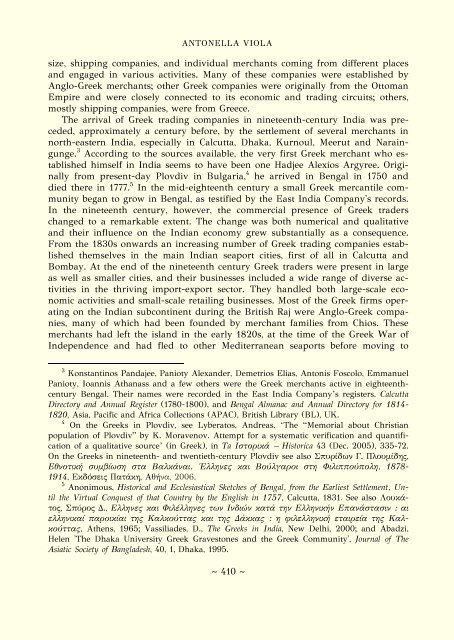Create successful ePaper yourself
Turn your PDF publications into a flip-book with our unique Google optimized e-Paper software.
ANTONELLA VIOLA<br />
size, shipping companies, and individual merchants coming from different places<br />
and engaged in various activities. Many of these companies were established by<br />
Anglo-Greek merchants; other Greek companies were originally from the Ottoman<br />
Empire and were closely connected to its economic and trading circuits; others,<br />
mostly shipping companies, were from Greece.<br />
The arrival of Greek trading companies in nineteenth-century India was preceded,<br />
approximately a century before, by the settlement of several merchants in<br />
north-eastern India, especially in Calcutta, Dhaka, Kurnoul, Meerut and Naraingunge.<br />
3 According to the sources available, the very first Greek merchant who established<br />
himself in India seems to have been one Hadjee Alexios Argyree. Originally<br />
from present-day Plovdiv in Bulgaria, 4 he arrived in Bengal in 1750 and<br />
died there in 1777. 5 In the mid-eighteenth century a small Greek mercantile community<br />
began to grow in Bengal, as testified by the East India Company's records.<br />
In the nineteenth century, however, the commercial presence of Greek traders<br />
changed to a remarkable extent. The change was both numerical and qualitative<br />
and their influence on the Indian economy grew substantially as a consequence.<br />
From the 1830s onwards an increasing number of Greek trading companies established<br />
themselves in the main Indian seaport cities, first of all in Calcutta and<br />
Bombay. At the end of the nineteenth century Greek traders were present in large<br />
as well as smaller cities, and their businesses included a wide range of diverse activities<br />
in the thriving import-export sector. They handled both large-scale economic<br />
activities and small-scale retailing businesses. Most of the Greek firms operating<br />
on the Indian subcontinent during the British Raj were Anglo-Greek companies,<br />
many of which had been founded by merchant families from Chios. These<br />
merchants had left the island in the early 1820s, at the time of the Greek War of<br />
Independence and had fled to other Mediterranean seaports before moving to<br />
3 Konstantinos Pandajee, Panioty Alexander, Demetrios Elias, Antonis Foscolo, Emmanuel<br />
Panioty, Ioannis Athanass and a few others were the Greek merchants active in eighteenthcentury<br />
Bengal. Their names were recorded in the East India Company’s registers. Calcutta<br />
Directory and Annual Register (1780-1800), and Bengal Almanac and Annual Directory for 1814-<br />
1820, Asia, Pacific and Africa Collections (APAC), British Library (BL), UK.<br />
4 On the Greeks in Plovdiv, see Lyberatos, Andreas, ‘The “Memorial about Christian<br />
population of Plovdiv” by K. Moravenov. Attempt for a systematic verification and quantification<br />
of a qualitative source’ (in Greek), in Ta Iστορικά – Historica 43 (Dec. 2005), 335-72.<br />
On the Greeks in nineteenth- and twentieth-century Plovdiv see also Σπυρίδων Γ. Πλουμίδης,<br />
Εθνοτική συμβίωση στα Βαλκάναι. Έλληνες και Βούλγαροι στη Φιλιππούπολη, 1878-<br />
1914, Εκδόσεις Πατάκη, Αθήνα, 2006.<br />
5 Anonimous, Historical and Ecclesiastical Sketches of Bengal, from the Earliest Settlement, Until<br />
the Virtual Conquest of that Country by the English in 1757, Calcutta, 1831. See also Λουκάτος,<br />
Σπύρος Δ., Ελληνες και Φιλέλληνες των Ινδιών κατά την Ελληνικήν Επανάστασιν : αι<br />
ελληνικαί παροικίαι της Καλκούττας και της Δάκκας : η φιλελληνική εταιρεία της Καλκούττας,<br />
Athens, 1965; Vassiliades, D., The Greeks in India, New Delhi, 2000; and Abadzi,<br />
Helen 'The Dhaka University Greek Gravestones and the Greek Community', Journal of The<br />
Asiatic Society of Bangladesh, 40, 1, Dhaka, 1995.<br />
~ 410 ~



